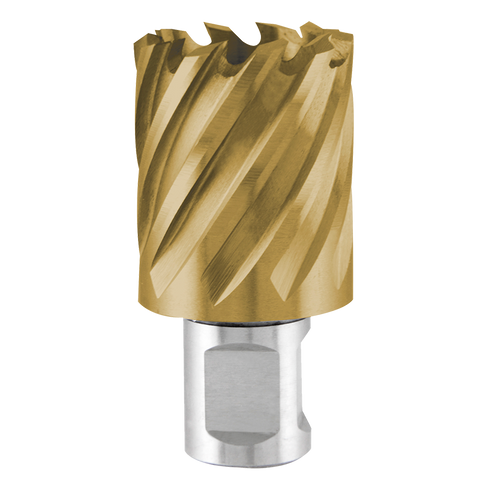What is a Weldon Shank?
This is an insight into a Weldon Shank, also referred to as a Weldon Flat, what they are and what the purpose of them is. Some would regard Weldon Shank as outdated, however that may not be the case. This insight will also explore the advantages and disadvantages of Weldon Shanks.


Weldon Shank Overview
In simple terms, a Weldon Shank contains one or more flat sections to a straight shank drill bit (or similar tool). This derives its alternative name of a Weldon Flat. The flat locking drive section (or sections) ensures a strong and secure hold when undertaking any drilling, milling or cutting applications. This prevents any slippages or loose rotations from the drill machine/device during the applicational process. When fast-paced machining or a heavy workload with extra torque by the drill is required, the Weldon Shank maintains a fixed hold against the powerful forces of the drilling action. Predominantly, Weldon Shanks/Flats are often found in End Mills and Core Drills (or otherwise known as Annular Cutters) and frequently used in milling projects.
End Mills Explained
A form of milling cutter used within milling tasks, these are distinguishable to standard drill bits by various different factors. Commonly used within grinding, engravings, profile milling, tracer milling, face milling and plunging. Compared to drill bits which drill and cut in an axial direction, most mill bits take a radial direction. End Mill Bits, however, allow for axial cutting. Flat-end mills are usually manufactured from High-Speed Steel (HSS), Cobalt or Carbide and help to create a square edge in many metal, wood, plastic and wax materials. In support of drilling through tougher materials, End Mills often feature certain coatings such as Titanium Nitride (TIN), Aluminium Titanium Nitride (AlTiN) and Titanium Carbonitride (TiCN)

Core Drill/Annular Cutters Explained
Core Drill Bits or Annular Cutters (sometimes referred to as Broach Cutters), make it easier to drill holes in thick metal slabs. This type of drill is best suited to holes larger than 1/2". When drilling thick holes in metal or aluminium, you should opt for a core drill rather than a standard twist drill, as these can be tough to operate. Core drills are similar to wood hole saws, as they only cut the outer edge of a hole. They cut a groove around the outside of the hole, leaving a solid core or slug in the middle of it. A burr-free, close tolerance hole can be drilled without any pre-drilling or step drilling. Core drills are typically used with mag drills, but they can also be employed on machine tools like mills and huge drill presses with tool holders. For example, when using a mag drill attached to a large piece of steel for construction work, this type of mechanical cutter can be used to create large diameter holes.
A Brief History of Weldon Shanks
Invented in 1918 by Carl Bergstrom, a toolmaker who founded the Weldon Tool Co. in Cleveland, Ohio, U.S.A. Bergstrom found that his earlier invention of the end mill (with 30-degree helical flute) had tendencies to break free or loosen during milling processes. A technique known as pull out. To resolve this, he grounded and carved a flat surface to the side of the shank and followed this up with a small hole drilled and tapped to allow for a setscrew to be locked into place. This invention allowed his end mills and core drill bits to be securely fastened into the drilling machine device and hold even under the most strenuous cutting/drilling activities. Even to this day, many people still utilise the weldon shank in many drilling and milling applications and devices such as CNC Machines.
Advantages of a Weldon Shank
- Ideal for rough machining.
- Keeps a safe strong hold fit with no slipping.
- Removes vast amounts of material.
- The high-strength capability of Weldon Shanks provides optimal machining parameters for aggressive materials such as Titanium.
- Prevents pull out tendencies where a tool starts to loosen and finds itself twisting out of the holder.
Disadvantages of a Weldon Shank
- Cost factors can be an issue for some people. Especially with added coating, as Weldon Shank Tools can be more expensive compared to standard shank tools.
- Weldon Shanks can go off centre, this causes a runout problem which could have significant side effects on the life of the tool.
- They are used for very specific job roles, as such they may not provide much financial benefit to a lot of people. They are of more benefit to machine drilling applications.
- Imbalance of the tool is a typical problem as trades personnel often must make sure the holder is well balanced or find that a critical fatal error could be found in their workpiece.
Summary
Although Weldon Shanks/Flats are for specific applications, they are still prominent and beneficial in the modern-day world of milling or drilling for CNC Milling Machines and Machine Drilling Devices. The pros and cons must be weighed up to determine whether a Weldon Shank Tool is necessary for certain projects, workplaces/industries or individuals.

Safety is vital in any drilling or cutting processes, regardless of whether it is a minor DIY Task to a heavy-duty industrial construction build project. Make sure you are protected with a range of PPE Accessories available with Free Next Working Day Delivery from Quality Tools UK.
- 0 comments
- Tags: Aluminium Drilling, Annular Cutters, Broach Cutters, Construction Tools, Core Drills, DIY, Drills, Milling, RUKO, Step by Step Guide/Demonstration, TERRAX, Workshop Applications
0 comments


